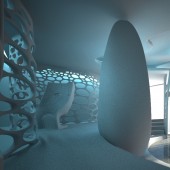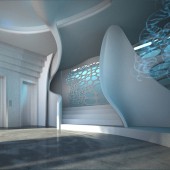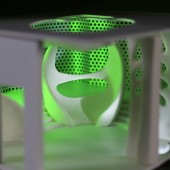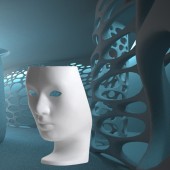Pharmacy Gate 4D Corporate Architecture Concept by Peter Stasek Architect |
Home > Winners > #30260 |
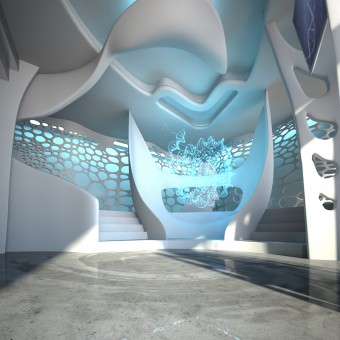 |
|
||||
| DESIGN DETAILS | |||||
| DESIGN NAME: Pharmacy Gate 4D PRIMARY FUNCTION: Corporate Architecture Concept INSPIRATION: The project “Pharmacy Gate 4D” represents an intermediary architectural concept for the entrance hall of the German branch of a global US-based pharmaceutical company. “Pharmacy Gate 4D” was created in dependence on the company slogan „A Promise for Life“ and thus is able to express this company feature in the form of corporate architecture, amongst others with the aid of holographic projection. UNIQUE PROPERTIES / PROJECT DESCRIPTION: The creative concept is based on the combination of material and immaterial components, which together create a media platform. The centre point of this platform is characterized by an oversized bowl as a symbol for an abstract alchemy goblet above which a holographic diagram of a floating DNA strand is projected. This DNA hologram, which in fact represents the slogan „A Promise for Life“, rotates slowly and suggests the easiness of life of a symptom-free human organism. The rotating DNA hologram not only represents the flow of life but also the relationship between light and life itself. In the background of this bowl, an additional symbol of human life appears, a human face in the form of the 3D sculpture „Nemo“. OPERATION / FLOW / INTERACTION: The interior design concept Pharmacy Gate 4D should demonstrate the cutting egde technology of a global operating chemistry concern. PROJECT DURATION AND LOCATION: Abbott Laboratories Knollstraße 50 67061 Ludwigshafen Germany FITS BEST INTO CATEGORY: Interior Space and Exhibition Design |
PRODUCTION / REALIZATION TECHNOLOGY: This scenario is framed by organically shaped wall coverings with perforations in the form of abstract organic structures. The 3D TV in 21:9 format, which transmits internal and external news to all persons in the hall, is also an essential communication medium within the new interior concept. The entire choice of materials for the interior is based on the utilisation of smooth surfaces, such as Corian, with rounded edges. Especially the perforated screening walls and their organically shaped layout are supposed to bring a muscle fibre structure to everyone’s mind. In this manner, a smooth unintrusive background for all components in the room will be generated. As a contrast to this, the existing elevator shaft is covered with silver-coloured panels made from extruded aluminium (Alusion), whose surface structure resembles the bone structure and thus makes the elevator appear as a constructive element. For the floor covering, a joint-free coating with a concrete look is to be deployed. This coating is also to be allotted in organically shaped main features and forms the basis of the entire composition „A Promise of Life“. An additional accentuation of some parts of the walls as well as of the ceiling cut-out is achieved by RGB LED illumination which is able to generate space dynamics that complement the hologram. SPECIFICATIONS / TECHNICAL PROPERTIES: The projected DNA hologram, which can be understood not only as an allusion to research in the field of gene technology but also of quantum biology, was developed in cooperation with Linda Law, Executive Director of the Center for 4D Arts, New York. The virtual 3D DNA model is a development of the Department of Environmental Health, Cincinnati, and was kindly made available by its scientific assistant Alexey Porollo. The holographic implementation of the DNA model can be realized by the Human Genome Research Center at the Cold Spring Harbor Labs, Long Island. TAGS: Peter Stasek Architect, Peter Stasek, Licht-Team Speyer, Licht-Center Speyer RESEARCH ABSTRACT: - CHALLENGE: The junction of holography projection into the parametric interior design. ADDED DATE: 2013-09-22 00:48:13 TEAM MEMBERS (7) : Peter Stasek architect - corportate architecture concept, Luana Kroner-Stasek architect - interior design, Linda Law, Executive Director of the Center for 4D Arts, New York, holography development, Alexey Porollo - Department of Environmental Health, Cincinnati, 3D DNA model, Stefan Möller - Licht-Center Speyer, Germany - illumination, Tobias Barz - visualization and IMAGE CREDITS: Peter Stasek Architect |
||||
| Visit the following page to learn more: http://www.competitionline.com/de/projek |
|||||
| AWARD DETAILS | |
 |
Pharmacy Gate 4d Corporate Architecture Concept by Peter Stasek Architect is Winner in Interior Space and Exhibition Design Category, 2013 - 2014.· Press Members: Login or Register to request an exclusive interview with Peter Stasek Architect. · Click here to register inorder to view the profile and other works by Peter Stasek Architect. |
| SOCIAL |
| + Add to Likes / Favorites | Send to My Email | Comment | Testimonials | View Press-Release | Press Kit | Translations |

